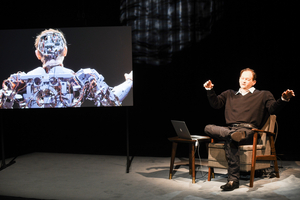Review: UNCANNY VALLEY, Battersea Arts Centre
Rimini Protokoll bring their state-of-the-art animatronic to London and highlight the negotiation between the need to be public people with our mental health needs.
 We've been saying it for decades, robots are going to take over the world. While it's obvious now that there are many jobs that can be undertaken by more efficient metal arms and the lot, for a while we latched on to the reassurance that there are some things that they simply cannot do - being empathetic or feeling, for instance.
We've been saying it for decades, robots are going to take over the world. While it's obvious now that there are many jobs that can be undertaken by more efficient metal arms and the lot, for a while we latched on to the reassurance that there are some things that they simply cannot do - being empathetic or feeling, for instance.
While working robots have the tendency to be removed from looking like the human figure, it's more and more common to see humanoid machines in human roles. They're carers and sexual partners, customer service assistants and hotel receptionists.
There are a number of films about this, and they never seem to end well for our race. Still, while it happens all around the world, it feels like science-fiction. But is it really? Before stepping into the auditorium at Battersea Arts Centre, we thought a robot could hardly be employed as an actor. And yet, here it is, a robot actor. A... roctor? Ractor? Never mind!
Rimini Protokoll's Uncanny Valley is less of a play and more of an entrancing curiosity, skirting the feel of a modern freak show attraction. It's a little unsettling at the start, then intrigue prevails as, at once, we find ourselves all waiting with collective bated breath for him (it?) to make a move. The pretext of this android experiment is a lecture held by author Thomas Melle on robotics and the uncanny valley effect delivered by a robot bearing his likeness. Dubbed as such by professor Masahiro Mori in the late 70s, the term "uncanny valley" is used to describe the prevailing reaction of unease or revulsion when presented with humanoid robots that are too realistic.
And Melle's electronic double bears an eerie resemblance to his real life inspiration indeed; it's a freaky experience to see him/it referring to Melle as himself when he appears on the nearby screen. He reflects on his mental health and the impact it's had on his duties. Manic depression has hindered his power to deliver constant and solid work, which is something a robot could never struggle with. Hence the android in front of us. But the machine doesn't address its (his?) nature directly until later on the hour-long show, until the Turing test is brought up and, to an extent, engaged.
The latest point in Melle's lecture is ticked and we're treated to a tribute to the father of modern computer science, Alan Turing, and how the system ultimately failed him. While he/it gains consciousness of him/itself, we see glimpses of the process that brought him/it to life. The true Melle is a projected presence all along, interviewing individuals who benefit from different kinds of electronic implants like prosthesis and hearing aids as he indirectly shares his experience with depression and the need to remove himself from the public eye. Humans become machines and machines become human. Eventually, while the robot muses on the deep craving of separation between his private strife and social commitments, Melle's face and shoulders are buried in plaster to cast his features for the speaker, putting this in sharp, allegorical perspective.
Stefan Kaegi's creation is astonishing. While this is not the first time audiences have been introduced to animatronic entertainers - the Disney Parks boast a creepy array of them - this is something else entirely. It's personal and - what a paradox! - human. From its first squint against the spotlight that suddenly illuminates it, the automaton is an empathetic, sarcastic humanoid that betrays its electronic anatomy only when its arms move or you catch a glimpse of the tangle of wires that sits at the back of its sectioned skull.
In the fiction of the production, Melle's alter ego guarantees a stability that was denied to him by his condition. In reality, it's very easy to compare it to some sort of Frankenstein's Monster. He/it even admits that instead of empathising with its crowd he/it could be reprogramming itself and become evil. While it's a tremendous reflection on humanity and its relation to machines as well as presenting a fine piece of artificial intelligence, it also highlights the negotiation between the need to be public people with our mental health needs.
Uncanny Valley runs at Battersea Arts Centre until 26 February.
Photo credit: Gabriela Neeb
Reader Reviews
Videos

